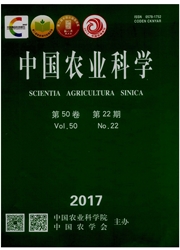

 中文摘要:
中文摘要:
【目的】为揭示柱花草的耐铝机制,对铝诱导根系分泌柠檬酸进行了研究。【方法】采用水培方法,研究柱花草的耐铝性及铝对柱花草分泌柠檬酸的影响,并与紫花苜蓿进行对比。【结果】10μmol·L^-1AlCl3对柱花草幼根生长的抑制不显著,而3和5μmol·L^-1AlCl3处理24h后,紫花苜蓿幼根伸长明显受阻、根尖的铬天青着色明显。铝胁迫下柱花草根系分泌柠檬酸,且与铝浓度(10、20、30μmol·L^-1 AlCl3)和处理时间(6、12、18、24h)呈正相关,而紫花苜蓿根系无明显分泌。10μmol·L^-1阴离子通道抑制剂(苯甲酰甲醛、尼氟灭酸、4,4-二异硫氰2,2-二磺酸、蒽9羧酸)显著抑制铝诱导的柱花草根系分泌柠檬酸。然而,铝处理对柱花草根尖柠檬酸合酶活性的影响不显著,蒽9羧酸处理也不改变该酶活性。【结论】根系分泌柠檬酸是柱花草抵御铝毒害的可能机制,而阴离子通道介导此分泌过程。
 英文摘要:
英文摘要:
【Objective】 To reveal the mechanism responsible for Al-resistance in stylo (Stylosanthes),Al-induced secretion of citrate from roots was investigated. 【Method】 The Al-resistance and the effect of Al on the secretion of citrate from roots in stylo (cv. Reyan 2) with comparison to alfalfa (Medicago sativa L.,cv. Sunshine 3) were studied by hydroponics. 【Result】 There was no dramatic inhibition on the root elongation of stylo exposed to a 10 μmol·L^-1 AlCl3 solution,while root elongation was inhibited significantly and the root apices were strongly stained by cyanine R in alfalfa after exposure of roots to 3 or 5 μmol·L^-1 AlCl3 for 24 h. Under Al stress,citrate was secreted from roots of stylo. The amount of citrate secretion in stylo was increased with the increasing Al concentration (10,20,30 μmol·L^-1 AlCl3) and the duration of Al treatment (6,12,18,24 h),but citrate was not secreted from roots in alfalfa. On the other hand,10 μmol·L^-1 anion channel inhibitors including phenylglyoxal,niflumic acid,4,4'-disothiocyanastilbene-2,2'-disulfonic acid,and 9-anthracenecarboxylic acid blocked the secretion in stylo. However,neither Al treatment nor the treatment with A-9-C failed to affect the citrate synthase activity of the root apices significantly in stylo. 【Conclusion】 These results suggest that Al-induced secretion of citrate from roots may be a mechanism responsible for Al-resistance and the anion channels involve in the secretion in the stylo.
 同期刊论文项目
同期刊论文项目
 同项目期刊论文
同项目期刊论文
 期刊信息
期刊信息
